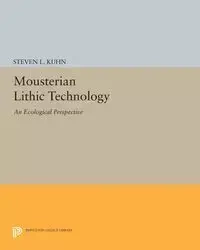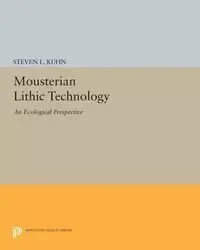Mousterian Lithic Technology - Steven L. Kuhn
- An Ecological Perspective
Human beings depend more on technology than any other animal--the use of tools and weapons is vital to the survival of our species. What processes of biocultural evolution led to this unique dependence? Steven Kuhn turns to the Middle Paleolithic (Mousterian) and to artifacts associated with Neanderthals, the most recent human predecessors. His study examines the ecological, economic, and strategic factors that shaped the behavior of Mousterian tool makers, revealing how these hominids brought technological knowledge to bear on the basic problems of survival.
Kuhn's main database consists of assemblages of stone artifacts from four caves and a series of open-air localities situated on the western coast of the Italian peninsula. Variations in the ways stone tools were produced, maintained, and discarded demonstrate how Mousterian hominids coped with the problems of keeping mobile groups supplied with the artifacts and raw materials they used on a daily basis. Changes through time in lithic technology were closely tied to shifting strategies for hunting and collecting food. Some of the most provocative findings of this study stem from observations about the behavioral flexibility of Mousterian populations and the role of planning in foraging and technology.
Originally published in 1995.
The Princeton Legacy Library uses the latest print-on-demand technology to again make available previously out-of-print books from the distinguished backlist of Princeton University Press. These editions preserve the original texts of these important books while presenting them in durable paperback and hardcover editions. The goal of the Princeton Legacy Library is to vastly increase access to the rich scholarly heritage found in the thousands of books published by Princeton University Press since its founding in 1905.
EAN: 9780691605203




Human beings depend more on technology than any other animal--the use of tools and weapons is vital to the survival of our species. What processes of biocultural evolution led to this unique dependence? Steven Kuhn turns to the Middle Paleolithic (Mousterian) and to artifacts associated with Neanderthals, the most recent human predecessors. His study examines the ecological, economic, and strategic factors that shaped the behavior of Mousterian tool makers, revealing how these hominids brought technological knowledge to bear on the basic problems of survival.
Kuhn's main database consists of assemblages of stone artifacts from four caves and a series of open-air localities situated on the western coast of the Italian peninsula. Variations in the ways stone tools were produced, maintained, and discarded demonstrate how Mousterian hominids coped with the problems of keeping mobile groups supplied with the artifacts and raw materials they used on a daily basis. Changes through time in lithic technology were closely tied to shifting strategies for hunting and collecting food. Some of the most provocative findings of this study stem from observations about the behavioral flexibility of Mousterian populations and the role of planning in foraging and technology.
Originally published in 1995.
The Princeton Legacy Library uses the latest print-on-demand technology to again make available previously out-of-print books from the distinguished backlist of Princeton University Press. These editions preserve the original texts of these important books while presenting them in durable paperback and hardcover editions. The goal of the Princeton Legacy Library is to vastly increase access to the rich scholarly heritage found in the thousands of books published by Princeton University Press since its founding in 1905.
EAN: 9780691605203

